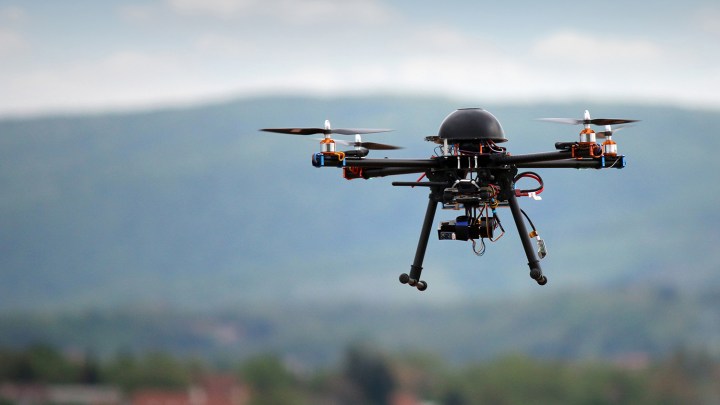
The system, which Deutsche Telekom is actively developing ahead of a planned launch later this year, is intended to prevent nefarious (or just plain ignorant) drone pilots from flying within the boundaries of airports, government installations, stadiums, and other venues where congested air traffic might present a problem. Car manufacturers are interested, too, reportedly because of a recent rash of journalists who’ve employed remote-controlled quadcopters to capture images of pre-production cars.
According to Dutch publication Welt am Sonntag, Deutsche Telekom’s system is purely visual, which is to say that it doesn’t actually prevent drones from entering restricted airspace. Instead, it’s comprised of an amalgamation of sensors, including ultrasound audio detectors, frequency scanners, and cameras, that help detect unwanted remote-controlled aircraft up to half a mile away.
The company completed a successful demonstration of the technology this past summer, in July, for which it invited a number of drone defense firms including U.S.-based Dedrone, Norway’s Squardhead Technology, Airbus’s Rohde & Schwarz, and Australia’s Droneshield.
In some ways, Deutsche Telekom’s solution falls short of the anti-drone efforts that have come before it. The SkyWall 100, a shoulder-mounted net launcher pioneered by a group of English engineers, uses a smart scope to automatically calculate the targeted drone’s distance and vector. Batelle’s DroneDefender rifle, meanwhile, knocks drones offline by emitting a series of high-intensity electromagnetic waves in rapid succession. And the U.S. Army’s new anti-UAV defense system, an an-drone weapon devised by engineers at Picatinny Arsenal in New Jersey, first 10-round burst of bullets from two 50mm Bushmaster cannons mounted atop a tactical vehicle.
But it’s well-suited for use in countries where incapacitating a trespassing drone remains a legally grey practice. Germany, for instance, forbids remotely deactivating a trespassing drone, but doesn’t forbid forcing it to return to its launch site by jamming its signal. Shooting down drones in the United States, meanwhile, remains illegal, and furthermore punishable by up to 20 years in prison, according to the U.S. Federal Aviation Administration ruling.
Some drone makers, including DJI, have implemented geofencing systems that prevent operators from flying and landing in locations designated as “off limits.” But those systems are platform dependent; platforms like Deutsche Telekom’s are effective against drones of all models.
At least one party has already expressed interest in deploying Deutsche Telekom’s system: soccer club FC Bayern. Reuters reports that the sporting outfit has been “looking for a system to fend off drones during soccer matches,” and that it previously talked to defense group Rheinmetall about the firm’s electromagnetic technologies.
Presumably, it’d be preferable to the Dutch police’s method of disabling errant drones: trained eagles.


